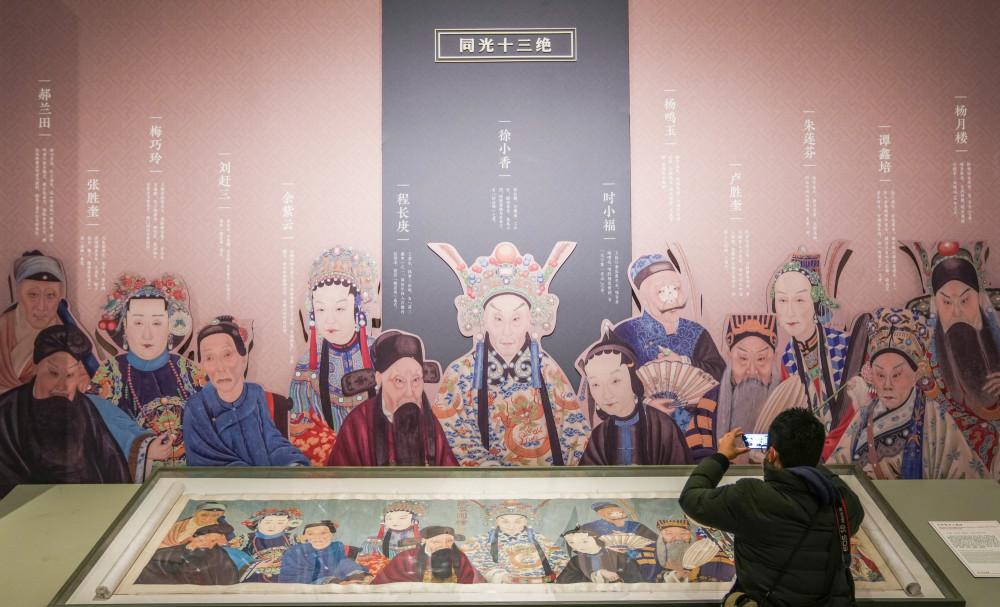On the 20th, "Mei Lan Fanghua - Mei Lanfang Art Life Exhibition" opened at the National Museum, with nearly 400 pieces (sets) of physical objects and nearly 600 pictures divided into eight units: "Qunying Spectrum Beijing Rhyme", "Mei Xiu Out of the Family", "Mei Zhan Hundred Flowers", "Mei Xin Yu Xuan", "Mei Xiang Chuan Wanli", "Plum Bone Proud Wind and Snow", "Plum Newspaper All Things Spring", "Mei Yun Exhibition New Sound" eight units, reproducing Mei Lanfang's artistic life.

Entering the exhibition hall, one by one, the objects full of the sense of age bring the audience into the play.
"The Thirteen Absolute Works of Tongguang" depicts the costume portraits of 13 famous actors from the Tongzhi and Guangxu periods. Through the glass of the display cabinet, the audience looked at each other with masters - Cheng Changgeng as Lu Su of "Qunying Society", Lu Shengkui as Zhuge Liang of "Zhan Beiyuan", Zhang Shengkui as Mo Cheng of "A Bunch of Snow", Yang Yuelou as Yang Yanhui of "Silang Visiting Mother"; Tan Xinpei as Huang Tianba of "Evil Tiger Village"; Xu Xiaoxiang as Zhou Yu of "Qunying Society"; Mei Qiaoling as Empress Xiao of "Yanmen Guan", Shi Xiaofu as Luo Shi of "Mulberry Garden Society", Yu Ziyun as Wang Baojun of "Cai Lou", Zhu Lianfen as Chen Miaochang of "Jade Hairpin"; Hao Lantian as "Walking Training" Kang Shi; Liu Chaisan as the country mother of "Visiting Relatives", Yang Mingyu as Min Tianliang of "Si Zhicheng".
The ink-printed Guangde Lou volunteer play "Mother and Daughter Society" has clear handwriting. This is one of the earliest surviving performances of Mei Lanfang. Experts say that it is a list of voluntary drama performances, and the performance form is more special, for "white oratorio". At that time, acting was forbidden during the national mourning period, but the long-term failure to appear on stage affected the livelihood of the actors, so this compromise method of not moving the loudspeaker and not walking through the head was adopted. Voluntary drama refers to performances that are not paid, and contain charitable and relief significance. At that time, the Guangde Building of the Theater Garden not only undertook business plays, but also held voluntary plays. This list of plays reflects the ecology of Peking Opera performances in Beijing at that time.
Familiar plays are staged through costumes, body maps, etc., and silence is better than sound. A fan surface, which was used by Mei Lanfang in June 1916 when she premiered "A Thousand Golden Smiles" at the Auspicious Theater, the peony on the fan surface was painted by his own hand. After the performance, the torn fan surface was re-framed into an album. The costume cloak of "Anti-Gold Soldier" adds Mei Lanfang's ingenuity - adding rivet elements to highlight the heroism of Liang Hongyu's scarf, which is similar to the yellow female cloak used in "Overlord Farewell".
The letters in the exhibition are worth savoring, and a vivid artist is restored between the lines. Mei Lanfang's letter to her grandmother promised that "I will return to Beijing immediately after singing, and I will never continue"; when Wang Yaoqing, a Peking Opera performance artist, writes a letter to Mei Lanfang, she will note that "tell Me that the second piece must not forget to buy me a hat"; Mei Lanfang wrote a letter to Cheng Yanqiu, ending with "My hands are sore, I will no longer write"...
According to Guobo, these are precious cultural relics and documents related to Mei Lanfang's artistic life, and some exhibits have not been published for a long time. The preciousness of Mei Lanfang's art lies not only in her unique natural conditions and painstaking efforts, but also in her progressive ideas, political embrace and national integrity. "A Wisp of Hemp", "Eunuch Sea Tide" and other fashion dramas that break feudal superstitions and feudal etiquette, historical dramas such as "Life and Death Hate" and "Anti-Gold Soldiers" that inspire the fighting spirit of the whole nation, the rehearsal repertoire of Mei Lanfang Theater Troupe has always been related to the changes of the times and is related to the rise and fall of the country. After the outbreak of the War of Resistance Against Japanese Aggression in an all-round way, Mei Lanfang resolutely refrained from colluding with the Japanese and the hypocrites and aiding and abetting abuse, and lived in Hong Kong and Shanghai with her family successively, singing and dancing, and growing a beard for eight years, during which she only relied on pawns and paintings as a continuation, and showed the lofty dignity and dignity of "preferring to be crushed by jade rather than for the whole" at the critical juncture of the nation. In the 1950s, Mei Lanfang actively practiced the purpose of "literature and art for the people", constantly innovated, built a performance system with deep national characteristics, and completed the sublimation and transformation from "the king of the world" to the people's artist. The exhibition is a perfect interpretation of Mei Lanfang's noble moral qualities.
During the exhibition, Guobo also specially launched the "Noble Concubine Drunk" theme coffee, allowing the audience to "immerse" the exhibition from visual to taste.